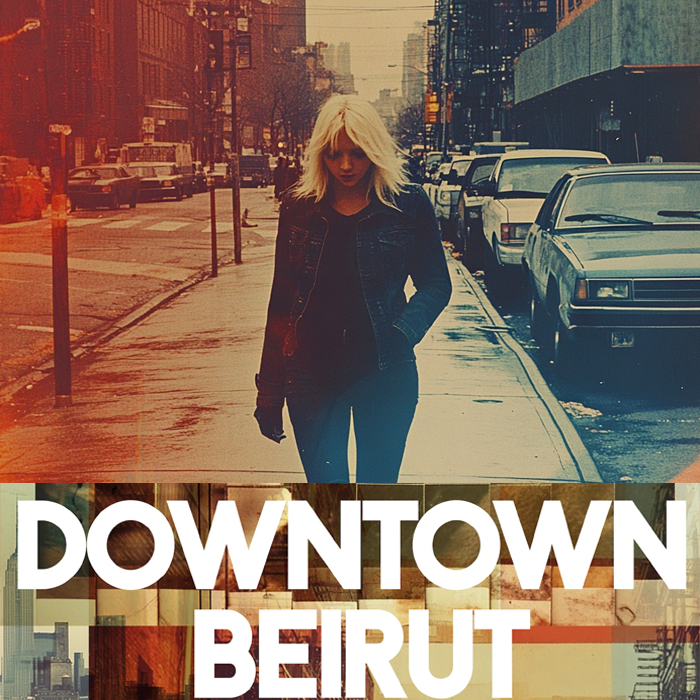Downtown Beirut #9
Kristen makes her move.

Kristen about town
Kristen swapped shifts with Marie, one of the other bartenders, and is coming off hers at 4pm. She steps into the tiny space Downtown Beirut calls its “backyard” and quickly changes into fresh clothes. She has a job interview.
She’s rattled and needs a cigarette to calm down. Some asshole threw a pint glass at her earlier in the day, and it scared her more than she let on. A couple of the other daytime drunks tossed his ass out on the sidewalk while she swept up the shards.
She steps out of Downtown Beirut into the brittle afternoon light, the city air feeling fresh compared to the bar’s stale breath. The East Village clings to her, its grime a second skin. Cracked pavement threatens to trip her as she walks past shuttered storefronts and slumped figures in doorways. She walks faster.
Crossing Third Avenue, she feels the shift. The sidewalks stretch wider here, the buildings stand taller, their fire escapes less like jagged scars across the face of buildings–they tuck them neatly in the back. She keeps her sunglasses on even though the sun hangs low and weak. She feels nervous. She feels like she’s an imposter.
Union Square’s just ahead. Broadway stretches north, a current of bodies, all of them walking like they know exactly where they're going. She moves with them, matching the pace, imagining making this walk every day. She adjusts her posture, rolling back her shoulders, standing taller. This is how you show confidence, she thinks.
The Garment District announces itself in flashes: headless mannequins behind glass, bolts of fabric stacked thick, a single high-heeled shoe abandoned on the curb. The loft building is unremarkable, almost unnoticeable if not for its number. When she steps inside an elevator large enough to hold a car, she imagines it carrying her up and out of one world and into another.
The door at the top is open. She steps inside.
The loft space stretches out before her, a cavern of exposed brick and ancient linoleum, the air thick with the smell of paint and turpentine.
She steps forward, her boots sticking slightly to the floor. The space hums with industry. Long tables line the walls, crowded with screens, ink, stacks of paper. Several young men and women in paint-smeared overalls move between them, their motions practiced, automatic. They don’t look up as she passes.
Near the far wall, a woman sits at a cluttered desk, her fingers flying over a calculator. She’s older than the others, her dark hair pulled into a tight bun, her mouth severe in dark red lipstick. Kristen approaches, her pulse loud in her ears. The woman glances up, her gaze sharp.
“Kristen Brezezicki?”
Kristen nods yes.
“We have a Kristen. Do you mind being Kris?” Kristen doesn’t mind at all. In fact, she loves it. The woman stands and gestures for Kristen to follow.
They weave deeper into the loft, past rows of drying prints, stacked canvases, a paint-caked shop sink, piles of scrap lumber, oddly, and finally a few couches placed around a coffee table. She motions for Kristen to sit, then flips open a folder. The questions are brisk, efficient. Kristen answers in nods, in short, clear sentences. She mentions the bar she works at. She doesn’t mention the glass that was thrown at her, or living in the squat with Ryder.
The woman’s pen scratches across paper. Then, without warning, she stands again.
“Come on,” she says.
They move toward a curtained-off area at the back. The woman pulls the fabric aside, revealing a space cluttered with televisions–some broken, others working, showing static, color bars, random looped images, and cartoons. A large, central television is placed opposite a polaroid camera on a tripod. The artist, recognized by Kristen as Andrew Kline, is engrossed in his work of capturing frozen frames of a cartoon with the polaroid. Dozens of prints lie on the floor at his feet.
He doesn’t look up as they enter.
The woman clears her throat.
The artist finally turns, his gaze sliding over Kristen, barely registering her.
“She would be the assistant,” the woman explains.
The artist nods, tells Kristen she’s hired, and returns to his work. The woman steers Kristen back into the main loft space.
“He’s like a monk. All he does is work. This is the best job I’ve ever had. I’m hiring you as my assistant, I’ll teach you, and in four months you’ll take over from me.” Kristen can’t believe it. The place is edgy and run down, but Andy Kline is famous, and there’s opportunity here. She can feel it.
“You’re gonna meet all kinds of great people,” the woman added, “last week we had Bowie in here.”
This is the New York City Kristen’s always dreamed of.
##
##